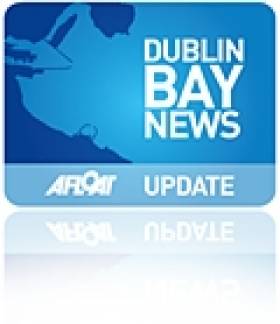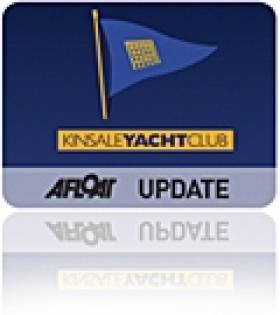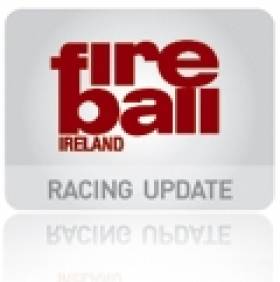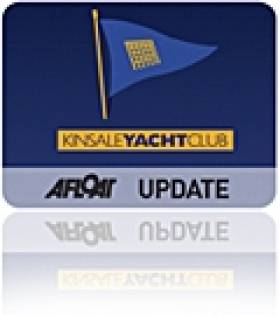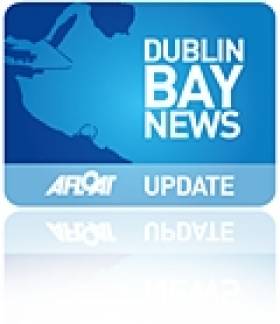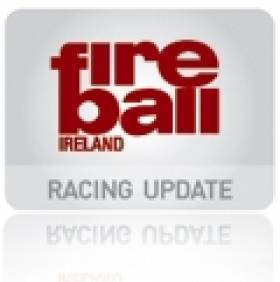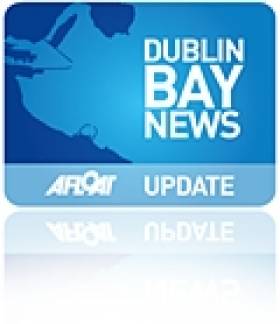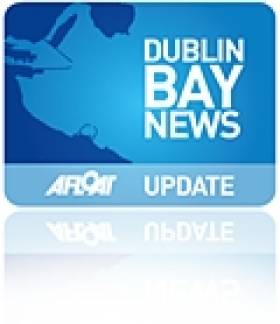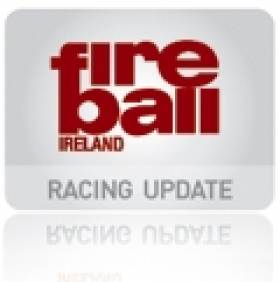Displaying items by tag: Frostbite
Strong Winds Cancel Dublin Bay Spring Chicken & DMYC Frostbite Series
#dbsc – Although Kinsale's natural harbour may have provided the necessary protection for the penultimate round of the south coast town's Frostbite series yesterday, there was no such shelter from the winds on the east coast with both of Sunday's Dublin Bay sailing fixures cancelled. DBSC's cruiser Spring Chicken organisers were forced to cancel in the morning and the DMYC dinghy frostbite series followed suit yesterday afternoon as gusts hit 40–knots off Dun Laoghaire harbour.
Kinsale Yacht Club Frostbite Series Produces Squib 'Battle Royale'
#kinsalesailing – The forecast for the penultimate day's racing of Kinsale YC's ASM sponsored Frostbite series indicated that there may not be any racing as winds of up to 40 knots were predicted. Many competitors failed to show up as they were convinced that racing would be abandoned.
However race officials managed to get 2 full races underway. The first race started with 12 knots gusting to 17 knots from the South West. Winds increased for the second race, the committee boat measured 16 knots with gusts of 22 knots prior to the start but once the race was underway, gusts rose to 28 knots. The sea was quite calm and fortunately the rain stayed away during racing.
The Lasers raced as one fleet and fresh conditions enabled the solitary Laser Radial sailor (188047 Charlie Moloney) to equally match his full rig counterparts. One of the Full Rig Lasers (161437 Paul Swanton) took a nasty spill in the first race and struck for home.
Once again the Squib fleet produced a battle Royale between club mates Colm Dunne & Rob Gill (Allegro 134), and Colm & Finny O'Regan (Fagin 100). Both had a first and second placing today. Colm & Rob are holding onto their lead of 5 points over Colm and Finny.
The series ends next week...
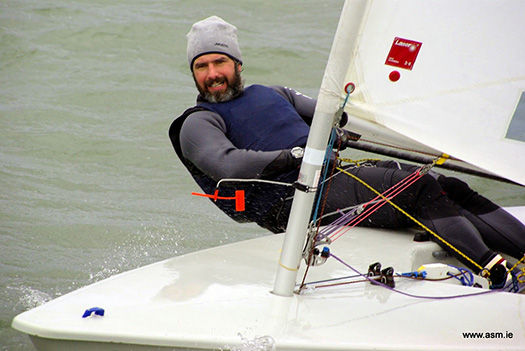
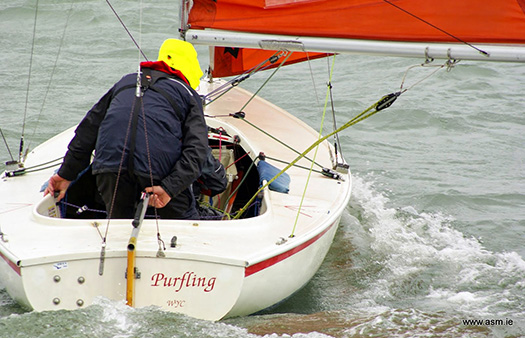
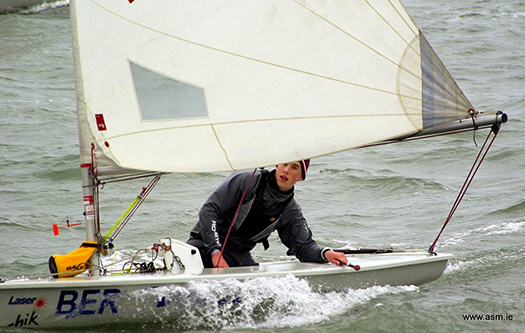
Cull Leads Howth Yacht Club Laser Frostbites
#laser – The Howth Yacht Club Laser Frostbiters were treated to a fantastic two races this morning writes Daragh Sheridan.
The race committee set a Windward / Leeward course for the first race of the day. A shift shortly before the start made the first beat somewhat one sided with a premium on tacking to port as soon as possible. Ronan Cull led around the Windward mark followed by Dan O'Connell, Mike Evans, Conor Costello and Ian Mc Sweeney. Our fleet captain Ian unfortunately capsized on the downwind much to the delight of those close to him. The race stayed tight with Cull taking yet another bullet followed by O' Connell and Daragh Sheridan taking third after an uncharacteristic mistake by Evans at the final Leeward mark. Eddie Rice had a storming comeback to take fourth after having to do turns earlier in the race. Costello clearly enjoying the breeze took fifth slot.
As the breeze continued to build the race officer decided to hold an Olympic course for race 2. As a result the fleet enjoyed some high speed reaches on the perfectly laid triangle. Once again Cull lead for the majority of the race but a capsize at the final windward mark allowed both Rice and O'Connell to capitalise. O'Connell then took full advantage of a big puff down the second last reach to grab the lead and held off Rice to the finish. Cull took the final podium place with Sheridan 4th and Evans 5th.
Unfortunately there were no Radials out this morning. In the 4.7s Sarah Gallagher took two firsts from Rory McEvoy. Sarah is now tied for the overall lead with Alex Kavanagh.
Overall Positions
Full Rig
1. Ronan Cull
2. Dan O'Connell
3. Daragh Sheridan
4. Eddie Rice
5. Mike Evans
Radial
1. Ewan Mc Mahon
2. Conor Twohig
3. Aoife Hopkins.
4.7
1. Alex Kavanagh
2. Sarah Gallagher
3. Rory McEvoy
Five Fireballs Come Out to Play at DMYC Dinghy Frostbites
#frostbites – Only five Fireballs sailed the single race in today's offering from the DMYC's Frostbite organisers. Messrs, McCartin, Butler, Rumball, Clancy, their respective crews and Louise McKenna and crew made up the starters writes Cormac Bradley.
The weather station adjacent the HSS Terminal and the Windfinder App were in agreement about some of the conditions – the weather station was recording a wind direction of 172˚, a base wind strength of 10.8 knots and a recorded gust of 21.7 knots, air temperature was a balmy (for February) 8.9˚. Windfinder predicted the direction as southerly, with a wind strength that would vary from 18 – 20 knots with gusts of 22 – 26 knots between 12 noon and 15:00.
The gusts were certainly there giving the fleet some interesting spinnaker legs, particularly on the top and bottom legs of the trapezoid course which was set in the middle and western half of Dun Laoghaire harbour – a weather mark just of the end of the HSS Ferry Gantry, No. 2 just inside the end of the East Pier, No. 3 in the middle of the harbour mouth and No. 4 off what I would refer to as the "blockhouse" on the West Pier.
"Cats paws" of harder wind were blowing across the course all afternoon and these provided some fun on the off-wind legs.
The fight at the start was to secure the slot beside the committee boat – four boats went for this as Louise was slightly delayed on her way out to the start. Ultimately, it was won by Rumball and Byrne (15058), but not before McCartin and Kinsella came in too early (from my position) and had to "bale out". The previous starts (PY Class, Lasers, RS 200 & 400s) suggested that the way to go was left, but McCartin & Kinsella, taking an early hitch to the right, subsequently crossed the other three on starboard tack and never looked back, leading from this initial crossing all the way to the finish. Butler & Oram (15061), Clancy & Clancy (15113) and Rumball & Byrne (15058) were in close company, until Rumball/Byrne capsized in a tack and fell out the back of the train. This "snookered" their race for though they got close enough to Clancy/Clancy to have the latter watching them carefully, they never recovered, place-wise, from their swim.
After the first weather mark there were no place changes but the relative fortunes of the boats did seem to change. At the end of the first lap McCartin & Kinsella looked very comfortable. Butler & Oram tried different things to close the gap but at each subsequent weather mark, bar the last, McCartin's lead was between 20 and 30 seconds. Only on the last beat was there a sense that Butler & Oram had dramatically closed on the leaders but at this stage McCartin & Kinsella were keeping a loose cover on them anyway. And Butler & Oram got caught up in traffic at this last weather mark to allow McCartin & Kinsella away again.
Earlier in the race it had seemed that Butler & Oram were resigned to not catching the leaders (and I realise how disrespectful that might seem) but one almost got the sense that they were covering the rest of the fleet, rather than trying to catch McCartin.
Though the weather station was recording a wind direction of 174˚, as I left my observation position, a two-degree variation from when I arrived, on the water the vagaries of the wind translated to tight reaches becoming broader reaches on the top leg of the trapezoid and decisions about two sailing or three sailing the bottom leg of the trapezoid.
|
DMYC Frostbites 2014/15 Series 2: Sunday, February 15th. |
1 |
2 |
3 |
4 |
5 |
6 |
Tot |
Nett* |
||
|
Barry McCartin & Conor Kinsella |
15114 |
RStGYC |
1 |
4 |
2 |
14 |
1 |
1 |
23 |
9 |
|
Noel Butler & Stephen Oram |
15061 |
NYC/DMYC |
2 |
3 |
1 |
2 |
3 |
2 |
13 |
10 |
|
Kenneth Rumball & Brian Byrne |
15058 |
INSC |
9 |
1 |
3 |
3 |
2 |
4 |
22 |
13 |
|
Conor & James Clancy |
15113 |
RStGYC |
9 |
5 |
4 |
1 |
4 |
3 |
26 |
17 |
*Assumes that a single discard is in play!
Today's race was Race 6 in Series 2 and the above table is my interpretation of where the leaders sit relative to each other.
RS400 Adds to Kinsale Yacht Club Frostbite Series
#kinsaleyachtclub – Day two of the ASM Kinsale Yacht Club frostbite series saw typical frostbite weather, cold, bright, sunny with near perfect sailing conditions. The wind was 10–knots gusting to 12.5 from NNW. Each of the 5 fleets got 3 great races in shifting conditions which made it a great test for all competitors. Each of the fleets had close racing, especially the ever popular Squib Fleet.
Race Officer & KYC Sailing Secretary, John Stallard was delighted to see the arrival this week of the RS400 fleet which has added greatly to competition and made for a beautiful spectacle in the bright sunshine on Kinsale inner harbour.
Maeve Leonard from RCYC appeared out today in the Laser Radial fleet and produced 3 bullets to dispense with all opposition. Her club mate Luke McGrath achieved the same result in the Laser 4.7 fleet.
The Full rig fleet was smaller today and the field is led by Monkstown's Ronan Kenneally followed by Club mate Paul O'Sullivan.
In the Squib fleet KYC's Colm Dunne and Rob Gill have an astonishing result of 6 bullets after 6 races, they are hotly pursued by KYC's Commodore Finny O'Regan and his son Colm.
Sail number 1260 takes the lead in the fledgling RS400 fleet.
Racing continues next week....
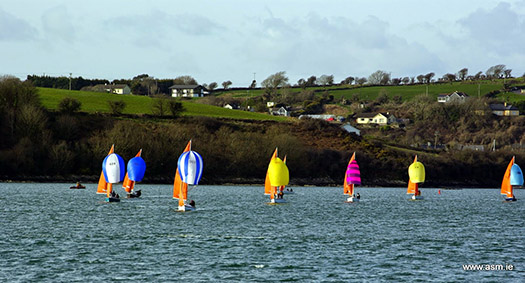
Squibs on a Run
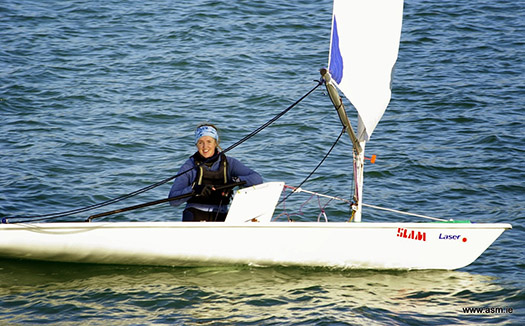
Maeve Leonard of RCYC looking happy with 3 wins from 3 races
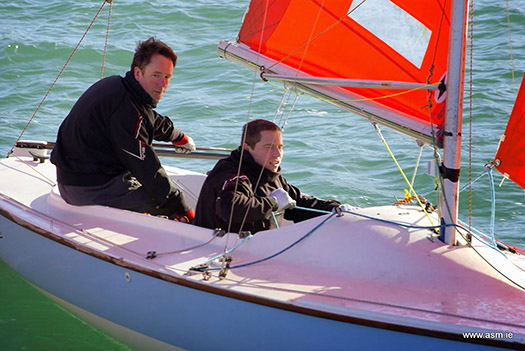
KYC's Colm Dunne & Rob Gill in their Squib Allegro, in the lead with 6 bullets after 6 races...
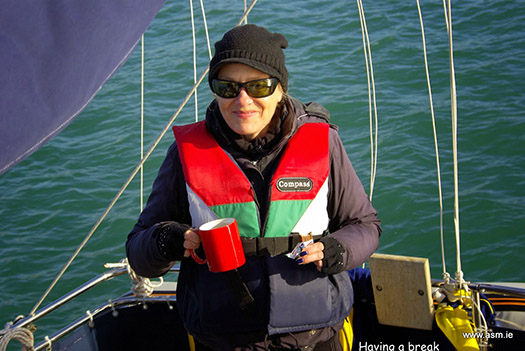
Committee Boat stalwart Sue Horgan
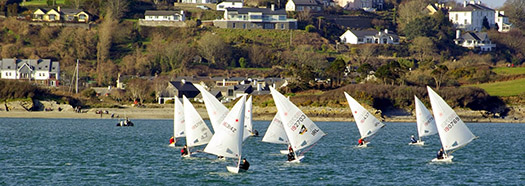
Lasers heading to Castlepark
All photos courtesy of Seamus McLaverty of ASM Marine
DMYC Frostbite Dinghy Racing Cancelled Again Due to Strong Winds
#dmycfrostbites – With both XCWeather and Windfinder forecasts suggesting similar conditions for 15:00, northerly winds of 20 knots with gust to 27/28 knots, air temperatures of 5/6˚, but, ironically sunny conditions, the organisers of today's DMYC Frostbites pulled the plug on the Dun Laoghaire dinghy racing series writes Cormac Bradley. N over A flies from the DMYC flagpole for yet another week!
#fireball – Irish National Fireball Champions, Barry McCartin & Conor Kinsella (IRL15114) made their Frostbite debut in Dun Laoghaire yesterday and utterly dominated proceedings, leading from start to finish and putting three-quarters of a lap between themselves and the chasing pack at the finish writes Cormac Bradley.
Eight Fireballs initiated Series 2 of the Frostbites, hosted by Dun Laoghaire Motor Yacht Club and they enjoyed lighter and more fickle conditions than were forecast for the day. The Windfinder app was suggesting 12 knots of SSW, but the weather station adjacent to my observation position suggested that the base wind strength was around 6 knots with a highest recorded gust of 10 knots and a direction of 162˚. The air temperatures of the two systems – app and weather station – were consistent at 7˚. Still, after a gap of five weeks, with the last three Sundays of Series 1 lost to adverse weather, the fleet would have enjoyed being on the water in any conditions.
Again, I missed the start (New Year’s resolution – get there on time!) and arrived as a cluster of Fireballs rounded the first weather mark. Even after a single beat, McCartin & Kinsella had some distance on the fleet. They were followed by Alistair Court & Gordon Syme (IRL 14706), Noel Butler & Stephen Oram (IRL 15061) and Neil Colin & Margaret Casey (IRL 14775). A trapezoid course was the order of the day with a long beat and a shorter top leg between 1 and 2. The weather mark was set just off the ferry gantry with the committee boat anchored off the west pier.
For the second beat, McCartin & Kinsella took a short port tack hitch before setting off on a long starboard leg to the weather mark. What appeared to be a healthy lead on the water as they approached the mark seemed to evaporate, but it was an illusion because on time they were 45 seconds up on the next boat. Court & Syme were still in second place, followed closely by Louise McKenna & Joe O’Reilly (IRL 14691), with Colin & Casey, Butler & Oram, Frank Miller (IRL 14713), Louis Smyth & Glen Fisher (IRL 15007) and Mary Chambers & Brenda McGuire (IRL 14865) following on.
The leg between 1 and 2 stayed as a tight reach throughout the race and the bottom leg, 3 to 4 was likewise tight but the leg between 2 and 3 saw two different approaches being taken, continue on starboard tack towards the harbour mouth, or gybe and sail a slightly higher line to Mark 3. At Mark 4 the second time the fleet compacted, with the exception of the leaders who at this stage were in a “world of their own”. The tactic now appeared to be to tack earlier rather than later as the boats which went too far left found themselves in lesser breeze.
At Mark 1 for the third time, the lead was out to 2 minutes, the length of the leg between 1 and 2. The chasing pack seemed to have an established order with the sequence being Butler, Court, Colin, McKenna, Smyth, Chambers & Miller. However, for the balance of the race this group of seven had a persistent game of snakes and ladders before the finishing order was confirmed.
There were two elements to the beat now – stay in breeze and stay on starboard tack for as long as possible, taking the port hitch when the wind allowed. This meant that the fleet generally stayed inside the box created by the four marks of the course.
At the next rounding of the weather mark the sequence, apart from the leaders, who now had a two leg lead, was Colin, Butler, McKenna, Court, Miller, Chambers, Smyth. However, at Mark 3 they compacted again and in the process Chambers had the “door shut” on her, forcing her to drop spinnaker and tack to round the mark.
By the next rounding of the weather mark, Colin had got ahead of Butler, but his approach to the mark was interrupted by starboard tacked boats approaching the same mark. This allowed Butler to close but not pass Colin. McKenna and Court also rounded in close company followed by Smyth, Miller and Chambers, now slightly adrift due to her travails at the previous rounding of mark 3. By mark 2, Butler had taken Colin.
As the afternoon progressed, staying in wind became the primary challenge. On the last lap, Colin sailed on past mark 2 even though both McKenna and Court who had gybed at mark 2 seemed to have gained the upper hand on the water by this manoeuvre. However, he managed to sail “a circle route” to 3 and by staying in better breeze got his third place back again.
|
DMYC Frostbites 2014/15: Series 2, Round 1; 4th January 2015. |
|||
|
1 |
Barry McCartin & Conor Kinsella |
15114 |
RStGYC |
|
2 |
Noel Butler & Stephen Oram |
15061 |
NYC & DMYC |
|
3 |
Neil Colin & Margaret Casey |
14775 |
DMYC |
|
4 |
Louise McKenna & Joe O’Reilly |
14691 |
RStGYC |
|
5 |
Alistair Court & Gordon Syme |
14706 |
DMYC |
This result gave Barry & Conor the day’s Frostbite Mugs.
The DMYC clubhouse also hosted the prizegiving for Series 1 which had not taken place in December due to the last three races being abandoned due to adverse weather. DMYC Calendars were the prizes for the Series.
|
DMYC Frostbites 2014/15: Series 1, Overall (No discards). |
Pts. |
|||
|
1 |
Kenny Rumball & Brian Byrne |
15058 |
Irish National Sailing Club |
5pts |
|
2 |
Noel Butler & Stephen Oram |
15061 |
National Yacht Club & Dun Laoghaire Motor Yacht Club |
17pts |
|
3 |
Conor & James Clancy |
15113 |
Royal St. George Yacht Club |
21pts |
Kenny Rumball was not in attendance to receive his prize as he was in Australia returning the boat in which he finished seventh in Class and 12th overall (IRC) in the 2014 Rolex Sydney to Hobart Race. He raced with two other Irish sailors with strong Fireball connections – Barry Hurley and Kenny’s younger brother Alexander.
In other Irish Fireball related news, Conor Byrne was in 25th overall, after two races, in a fleet of 124 Tasars at their World Championships in Australia. Two other Fireball “connections” are also in action at this event; Chris Payne & Heather McFarlane were 15th overall after the same two races (and they won the Practice Race) and Ben Schulz was lying in 35th overall.
INSS Stage Mini Frostbite Series After DMYC Cancellation
#frostbites – After the baptism of fire from the morning's DBSC Turkey Shoot racing series, it was never a sure thing that the DMYC Frostbite Series would go ahead writes Kenneth Rumball. As predicted at approximately 12:15 the code flags N over A were hoisted above the DMYC on the West Pier in Dun Laoghaire. However a number of the younger sailors from the Irish National Sailing School had already gathered in the INSS Clubhouse and were keen to get out sailing after seeing the performance of their coaches in the breeze on the previous week. Knowing the condition from the morning racing, INSS manager Kenneth Rumball assisted by Glyn Williams and Alexander Rumball allowed the 9 keen young sailors to take out three squibs with a reef in to practise their starts and do a few short races inside the harbour.
Motoring out in the INSS launch which was to act as a committee boat for the day, there were a number of Laser Dinghies out sailing and also Shane McCarthy in his Solo dinghy despite the frostbite series being cancelled. In all there were 8 Lasers and the Solo. With Kenneth already planning on setting up a triangular course, and holding races for the Squibs, we invited the Lasers and the Solo to a separate start where we ran three races for the gang. Kenneth even jumped into the Solo for race number three to get a taste for the single-hander.
Our juniors in the Squib fleet used the conditions to build on their starting techniques which they have been struggling with in the PY class of the Frostbite series. The three boats crewed by three persons each soon shook out the reefs after conditions in the harbour were considerable more tame than the Turkey Shoot in the morning. Lorcan Tighe and his gang were dominant in the squibs, notching up three wins!
Sean Craig was consistently at the front if not helped slightly by his enthusiastic starting attitude. Great racing inside the harbour for the gang with lots of photos available on the INSS Facebook page here
Sail No. Race 1 Race 2 Race 3 Race 4 Cumulative
188347 1 4 1 2 8
171694 2 1 3 5 11
5302 6 5 2 1 14
200143 5 2 4 3 14
190317 7 3 5 4 19
177854 4 7 6 6 23
190745 3 6 7 9 25
165639 9 8 8 7 32
177891 8 9 9 8 34
DMYC Frostbiters Suffer Second Cancellation
#frostbites – For the second Sunday in succession DMYC frostbites was cancelled due to strong winds.
N over A is flying from the DMYC flagpole (at 12:32) with a confirming Facebook post that Frostbite racing is cancelled again - too gusty writes Cormac Bradley.
Contrary to my report last week, there is racing on the programme next Sunday - as advised/confirmed in the NoR and SI.
But for today there will be no water borne action!!
From my office view Dublin Bay is deceptive - it is an offshore breeze so the water is flat, but there are "catspaws" of harder wind skirting across the water. Further out there are whitecaps though they are not particularly big. XCWeather had been forecasting 16 knots with gusts in the mid-twenties.
It is a bright day with grey clouds over this part of the Bay with a brighter skyline to the north and east. A rainbow has just appeared over Poolbeg to the West!
TV time then? Scarlets v Ulster in Champions Cup Rugby or Utd v Liverpool in the Premier League!!
Seven Fireballs Line Out For DMYC Frostbite Dinghy Series
#fireballsailing – Seven Fireballers headed out to the bay on Sunday afternoon for race 5 of the DMYC Frostbite series, a race in the bay gave the fireballs a chance to stretch their legs on a longer course but with the spring tides in play, some tidal calculations were needed at all the turning marks of the course. Watching the PY fleet start before, it was clear a conservative start was needed and after waiting for our turn, all seven fireballs got away cleanly with no OCSs to mention, a rare time with Irish Fireballers.
Given the shifty conditions, the first beat was almost a fetch to the weather mark and most of the fleet tacked on to port almost instantly after the start, the Clancy brothers 15113 mastered the start line and took a dominant role on the left handside of the fleet. Neil Colin and Margaret Casey 14775 went out towards the right hand side while most of the fleet kept towards the middle of the course.
At the top mark, the Clancy brothers had held their lead and rounded first, followed by Colin/Casey, then Rumball/Byrne 15058 followed hot by Butler/Oram 15061. A quick hoist saw Rumball/Byrne overtake Colin/Casey on the top reach and then set off in hot pursuit of the Clancy brothers. By the first gybe mark of the trapezoid the Clancy brother still held their lead. Up the next beat Rumball/Byrne had closed the gap while Butler/Oram had managed to overtake Colin/Casey.
Round two of the course saw some good match racing between Rumball/Byrne and the Clancy brothers with Rumball/Byrne only managing to gain first place on the next upwind leg. The race continued with little place changing from here on as far as this writer can tell.
The finishing order is below with mug winners on the day of Louise McKenna & Hermine O'Keefe.
1. Kenneth Rumball Brian Byrne
2. Conor Clancy/James Clancy
3. Noel Butler/Stephen Oram
4. Luke Malcolm/Harry O'Reilly
5. Louise McKenna/Hermine O'Keefe
6. Neil Colin/Margaret Casey
7. Mary Chambers/ Brenda Mcguire



























